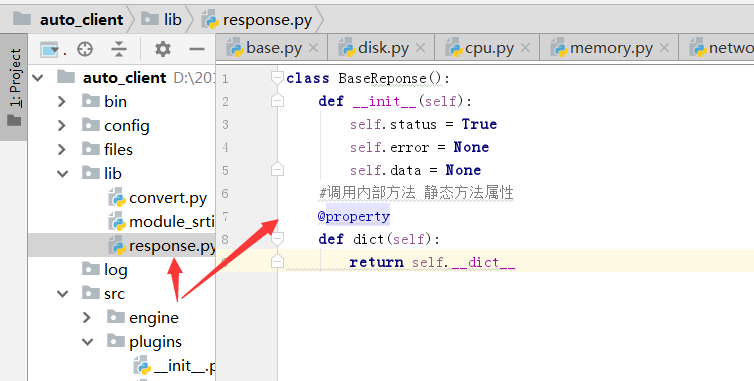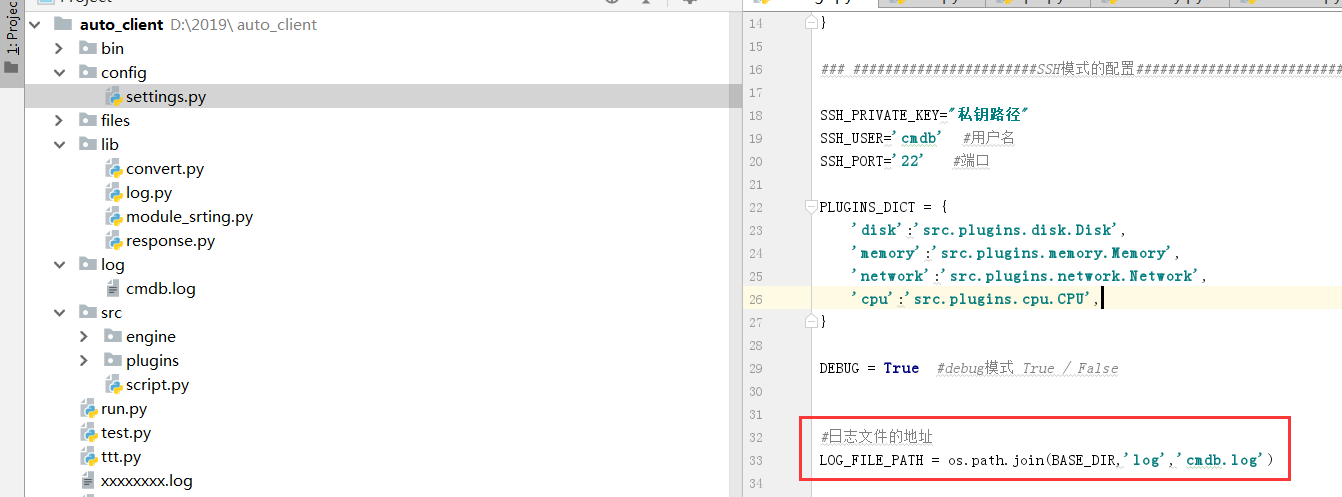首先采集disk的具体实现方上代码:
# !/usr/bin/env python # -*- coding:utf-8 -*- from .base import BasePlugin import os,re import traceback from lib.response import BaseReponse class Disk(BasePlugin): def win(self,handler,hostname): ''' 执行命令拿到结果-磁盘 :return: ''' print("执行win方法") ret = handler.cmd('wmic diskdrive',hostname)[0:10] return ret # def linux(self,handler,hostname): # ''' # 执行命令拿到结果-磁盘 # :return: # ''' # print("执行Linux方法") # # ret = handler.cmd('df -h',hostname)[0:10] # return ret def linux(self, handler, hostname): ''' 采集数据 :param handler: :param hostname: :return: ''' #实现错误信息记录,标记,post 提交到服务端,首先定义一个字典如下: # result = {'status':True,'error':None,'data':None} #字典的形式使用比较麻烦,所有这里在lib 文件中定义一个类来使用,看起比较高端些,使用方法是 ''' 这里是在 lib 文件实现的,使用的时候记得导入模块 class BaseReponse(): def __init__(self): self.status = True self.error = None self.data = None #调用内部方法 静态方法属性 @property def dict(self): return self.__dict__ ''' reponse = BaseReponse() try : if self.debug: output = open(os.path.join(self.base_dir, 'files', 'disk.out'), 'r').read() else: shell_command = "sudo MegaCli -PDList -aALL" #根据执行的命令 output = handler.cmd(shell_command, hostname) reponse.data = self.parse(output) except Exception as e: error_msg = traceback.format_exc() reponse.status = False reponse.error = error_msg return reponse.dict def parse(self, content): """ 解析shell命令返回结果 :param content: shell 命令结果 :return:解析后的结果 """ response = {} result = [] for row_line in content.split(" "): result.append(row_line) for item in result: temp_dict = {} for row in item.split(' '): if not row.strip(): continue if len(row.split(':')) != 2: continue key, value = row.split(':') name = self.mega_patter_match(key) if name: if key == 'Raw Size': raw_size = re.search('(d+.d+)', value.strip()) if raw_size: temp_dict[name] = raw_size.group() else: raw_size = '0' else: temp_dict[name] = value.strip() if temp_dict: response[temp_dict['slot']] = temp_dict return response @staticmethod def mega_patter_match(needle): grep_pattern = {'Slot': 'slot', 'Raw Size': 'capacity', 'Inquiry': 'model', 'PD Type': 'pd_type'} for key, value in grep_pattern.items(): if needle.startswith(key): return value return False
看见截图

按照上面采集磁盘的方法,在其它的 网卡,cpu 。内存 去实现下
#######################
下面是错误日志记录 ,是loging 模块实现,思路是让每次报错的是日志信息写入到文件中
按照原来思路,把功能写到lib 目录中进行掉用
配置文件中添加一个记录文件日志的路径配置信息

导入loging 到日配置文件
import logging from config import settings # file_handler = logging.FileHandler('xxxxxxxx.log', 'a', encoding='utf-8') # file_handler.setFormatter(logging.Formatter(fmt="%(asctime)s - %(name)s - %(levelname)s: %(message)s")) # # logger = logging.Logger('s1', level=logging.INFO) # logger.addHandler(file_handler) # # logger.info('1111') # logger.error('2222') class Logger: def __init__(self): self.path = settings.LOG_FILE_PATH file_handler = logging.FileHandler(self.path, 'a', encoding='utf-8') fmt = logging.Formatter(fmt="%(asctime)s - %(name)s - %(levelname)s -%(module)s: %(message)s") file_handler.setFormatter(fmt) self.logger = logging.Logger('cmdb',level=logging.INFO) self.logger.addHandler(file_handler) def info(self,msg): self.logger.info(msg) def error(self,mag): self.logger.error(mag) logger = Logger()
disk 采集文件实现代码如下
# !/usr/bin/env python # -*- coding:utf-8 -*- from .base import BasePlugin import os,re import traceback from lib.response import BaseReponse from lib.log import logger class Disk(BasePlugin): def win(self,handler,hostname): ''' 执行命令拿到结果-磁盘 :return: ''' print("执行win方法") ret = handler.cmd('wmic diskdrive',hostname)[0:10] return ret # def linux(self,handler,hostname): # ''' # 执行命令拿到结果-磁盘 # :return: # ''' # print("执行Linux方法") # # ret = handler.cmd('df -h',hostname)[0:10] # return ret def linux(self, handler, hostname): ''' 采集数据 :param handler: :param hostname: :return: ''' #实现错误信息记录,标记,post 提交到服务端,首先定义一个字典如下: # result = {'status':True,'error':None,'data':None} #字典的形式使用比较麻烦,所有这里在lib 文件中定义一个类来使用,看起比较高端些,使用方法是 ''' 这里是在 lib 文件实现的 class BaseReponse(): def __init__(self): self.status = True self.error = None self.data = None #调用内部方法 静态方法属性 @property def dict(self): return self.__dict__ ''' reponse = BaseReponse() try : if self.debug: output = open(os.path.join(self.base_dir, 'files', 'disk.out'), 'r').read() else: shell_command = "sudo MegaCli -PDList -aALL" #根据执行的命令 output = handler.cmd(shell_command, hostname) reponse.data = self.parse(output) except Exception as e: error_msg = traceback.format_exc() reponse.status = False reponse.error = error_msg # 记录错误日志 logger.error(error_msg) return reponse.dict def parse(self, content): """ 解析shell命令返回结果 :param content: shell 命令结果 :return:解析后的结果 """ response = {} result = [] for row_line in content.split(" "): result.append(row_line) for item in result: temp_dict = {} for row in item.split(' '): if not row.strip(): continue if len(row.split(':')) != 2: continue key, value = row.split(':') name = self.mega_patter_match(key) if name: if key == 'Raw Size': raw_size = re.search('(d+.d+)', value.strip()) if raw_size: temp_dict[name] = raw_size.group() else: raw_size = '0' else: temp_dict[name] = value.strip() if temp_dict: response[temp_dict['slot']] = temp_dict return response @staticmethod def mega_patter_match(needle): grep_pattern = {'Slot': 'slot', 'Raw Size': 'capacity', 'Inquiry': 'model', 'PD Type': 'pd_type'} for key, value in grep_pattern.items(): if needle.startswith(key): return value return False
其它的采集插件依次方法实现